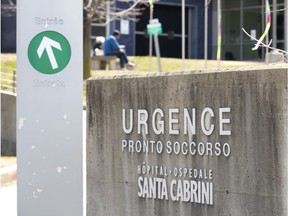The visits are raising the ire of some hospital staff, who are upset that they are being taken away from their pressing medical duties to be grilled by the OQLF.

Language inspectors from the Office québécois de la langue française are expanding the range of their inspections beyond businesses and are now targeting hospitals in the Montreal area, even going so far as to verify whether French is being spoken in operating rooms, The Gazette has learned.
In fact, an inspection is planned for Wednesday at Santa Cabrini Hospital, an institution built in 1960 to better serve Montreal’s Italian community. In preparation for Wednesday’s visit, Santa Cabrini managers issued a memo reminding staff to speak to all patients in French first.
The visits are raising the ire of some hospital staff, who are upset that they are being taken away from their pressing medical duties to be grilled by language inspectors.
“The medical staff are annoyed,” a Santa Cabrini source told The Gazette. “It’s probably some (employees from nearby Maisonneuve-Rosemont Hospital who) complained, since we have a lot of McGillers using English.”
An internal memo by Santa Cabrini, obtained by The Gazette, spells out for staff how to comply with Bill 96 in the health sector.
“The operating rooms and minor surgery (although closed on this day) will be visited by the OQLF on Wednesday,” the memo states.
“Here are a few reminders about the application of Bill 96 (‘An Act respecting French, the official and common language of Quebec’). All signage must be in French (Italian is accepted at Santa Cabrini, but the notice must also have a French version).
“The working language must be French at all times,” the memo adds. “All documents, notes and records must be in French at all times.
“Users must be addressed in French. If users do not speak French, they may ask to be addressed in another language. Apart from compliance with these sections of the law, no special measures are required for (Wednesday’s inspection).”
A year ago, OQLF inspectors visited the Jewish General Hospital in Côte-des-Neiges, another source told The Gazette. “They saw some old plaques in English and Yiddish listing the names of donors and they suggested that we put up another plaque in French.”
The second source, who also agreed to be interviewed on condition of anonymity, bristled at the notion of language inspectors touring busy hospitals to ensure that French is spoken.
OQLF spokesperson Chantal Bouchard explained the larger context of the hospital inspections.
“As of June 1, 2022, the Charter of the French Language requires organizations in the health and social services network to comply with the charter,” Bouchard said in an email.
“As part of this process, they must submit an analysis of their linguistic situation to the Office, leading to the issuance of an attestation of compliance. The Office issues an attestation of conformity when their use of French complies with the provisions of the charter and they meet their other obligations under the charter.
“It is within the framework of this approach that visits to different spaces can take place in (a health) establishment,” Bouchard added. “It is up to the establishment to determine the schedule and the sites to be visited, in conjunction with a representative of the establishment. If a facility offers to include an operating theatre in the tour, the visit always takes place in an unoccupied OR, in compliance with the facility’s safety guidelines.”
On the island of Montreal, the use of French in the health sector jumped from 2016 to 2022. “The proportion of people using French to communicate with health services increased by 2.8 percentage points (from 68.6 per cent to 71.4 per cent), while that of people using English decreased by 3.7 percentage points (from 23.3 per cent to 19.6 per cent),” the study observed.
Bill 96 requires that all government workers — including those in hospitals and nursing homes — use French exclusively in written and oral communications with their clients, with certain exceptions, like emergencies. Yet even before Bill 96’s adoption, the tenuous bilingual status of hospitals in the province had become a grave point of concern for Quebec’s anglophone community.